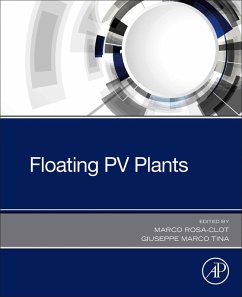Renewable energy sources (RES) are one of the important instruments that human beings can use to tackle problems created by climate change. We expect a quick expansion of RES in the next few years.
One important new technology is the floating photovoltaic (FPV) which is at its very beginning but which after only 10 years from its first proposal has already reached the target of 2 GWp of plants installed.
This book explores the reasons for such growth and the advantages of this new technology. FPV plants are easily integrated into any human settlements and can use available fresh water as well as salt water near coastal areas. So their geographic potential is unlimited.
Furthermore, their environmental impact is limited and the managing and decommissioning of plants are very cheap.
The book offers a perspective on the many facets of this technology as well as an analysis of the economic aspect and of the final electricity cost which in a short time will go down to less than 50 $ per MWh.
Contributions from different authors have helped in sectors such as the raft structure, the wave impact, and the environment problems.
One important new technology is the floating photovoltaic (FPV) which is at its very beginning but which after only 10 years from its first proposal has already reached the target of 2 GWp of plants installed.
This book explores the reasons for such growth and the advantages of this new technology. FPV plants are easily integrated into any human settlements and can use available fresh water as well as salt water near coastal areas. So their geographic potential is unlimited.
Furthermore, their environmental impact is limited and the managing and decommissioning of plants are very cheap.
The book offers a perspective on the many facets of this technology as well as an analysis of the economic aspect and of the final electricity cost which in a short time will go down to less than 50 $ per MWh.
Contributions from different authors have helped in sectors such as the raft structure, the wave impact, and the environment problems.
- Investigates the installation of photovoltaic systems over the water's surface
- Offers theoretical and practical explanations on how to study, analyze and design photovoltaic energy systems
- Considers how the use of floating photovoltaic systems can work to fulfill domestic energy demand
Dieser Download kann aus rechtlichen Gründen nur mit Rechnungsadresse in A, B, BG, CY, CZ, D, DK, EW, E, FIN, F, GR, HR, H, IRL, I, LT, L, LR, M, NL, PL, P, R, S, SLO, SK ausgeliefert werden.

